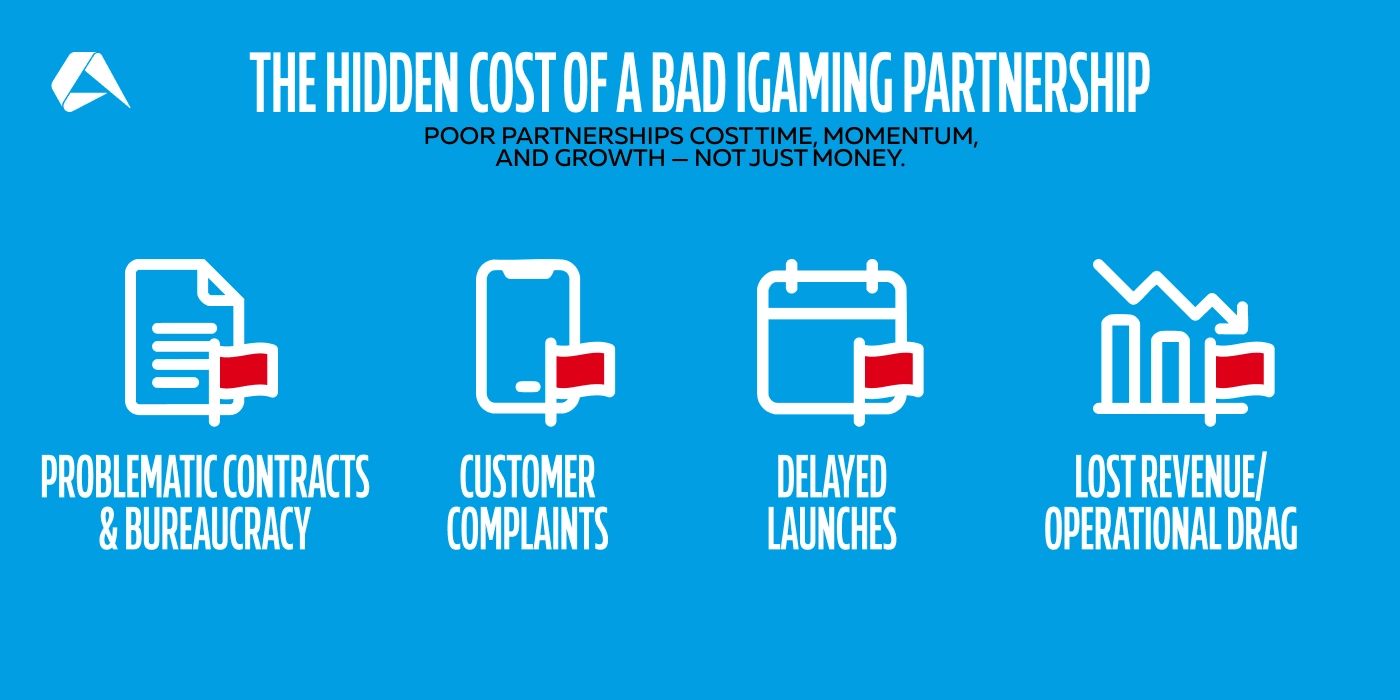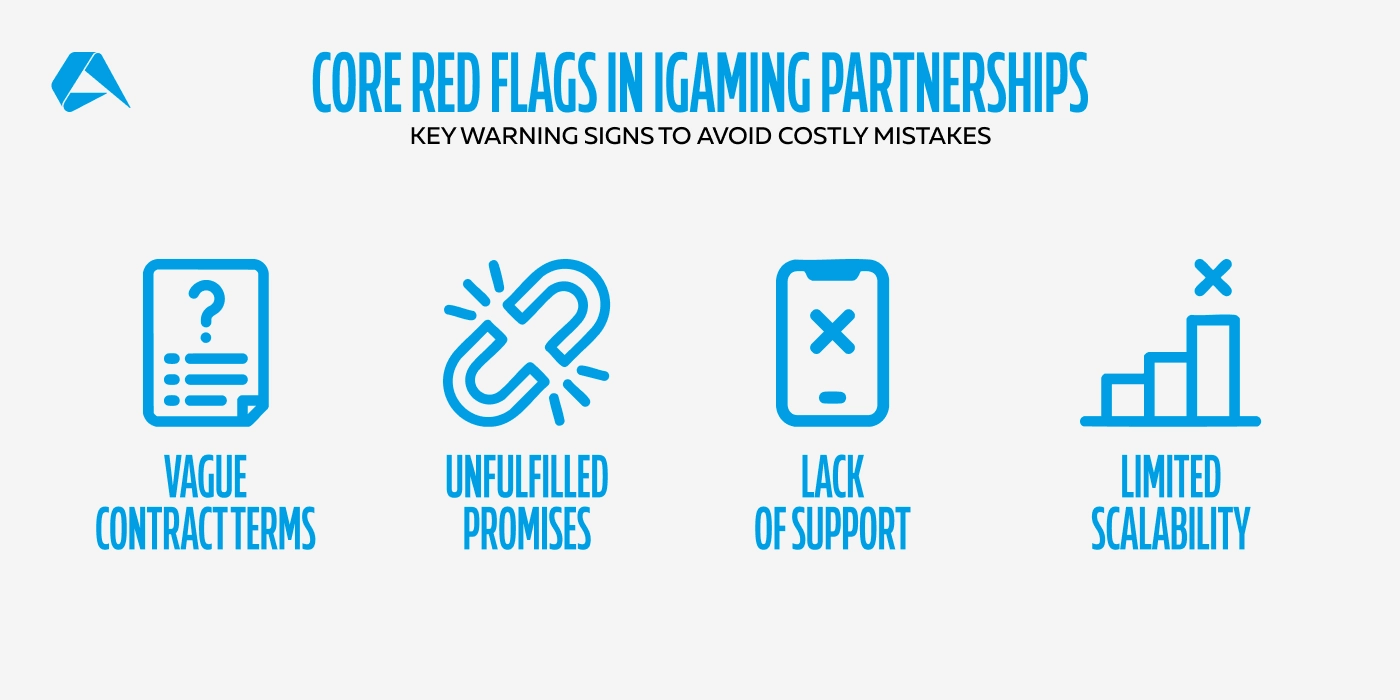Every experienced iGaming operator has their own story when it comes to vendors, and not all of them are great. Whether it’s a conflict in expectations, vague deliverables, or contracts that look good on paper but cause headaches in practice, the wrong partnership can slow you down fast, or worse, get you off to a poor start in your iGaming journey.
This guide is here to help you avoid that. It’s a quick-reference companion for operators who want more control, fewer surprises, and better outcomes from their supplier relationships, covering what to look for, what to walk away from, and how to fix things when they’re already in motion.
You don’t need to become a legal expert. You just need to ask the right questions, push for the right solutions, and remain clear on what you need. Let’s walk through that, together.
The Real Cost of a Bad Partnership

Setbacks in iGaming tend to show up unannounced. Usually, they creep in slowly, in the form of player complaints you didn’t expect, legal calls you didn’t want to take, and marketing results that feel less impressive than they should. And more often than not, the root cause is not your own team, but a third party you work with.
A bad partnership doesn't just mean poor performance. Often, it means eroded trust, wasted time, and delayed growth. Worse still, it’s rarely black and white. Let’s face it, partners seldom start badly. They go bad over time, or just weren’t built to scale with your ambitions. They become careless or too busy, possibly overpromising features they may never have built in the first place.
Ultimately, the outcome of these types of issues is operational drag. An extra two weeks to launch. An influx of customer complaints. A relationship with the regulator that becomes just a little more strained.
This is what we mean by the real cost. It’s not just about losing money. It’s primarily about losing momentum. And in this industry, that’s often harder to get back than cash.
Core Red Flags to Watch

The best partnerships in the industry are founded on clarity, boundaries, and a shared understanding of reality. Here are the main red flags to watch that will help you see what others miss, ask better questions, and build partnerships that hold up under pressure.
Licensing Mismatches
When a partner claims to operate under a specific license, but their activity, market reach, or setup suggests otherwise, it’s a significant risk. Mismatches between claimed and actual licensing can expose you to regulatory penalties, withheld funds, or reputational damage. Always verify that license details align with business operations, and that you're covered for the same jurisdictions and verticals.
Unclear Commercial Terms
If the core terms of a deal, such as revenue share, minimum guarantees, or traffic requirements, are vague, delayed, or buried in legalese, proceed with caution. Lack of clarity often means flexibility for them, but not for you. Push for plain language, upfront figures, and documented terms. If they're hesitant to spell things out in writing, it's sometimes because they plan to shift the goalposts later.
Compliance Ambiguity
You can’t afford uncertainty when it comes to responsible gambling tools, KYC, anti-money laundering protocols, or GDPR adherence. If a partner brushes off these topics or offers vague, reactive answers, it suggests compliance is not central to their culture. Regulators won’t care whose fault it was, so don’t tie your brand to partners who treat legal requirements as an afterthought.
Weak Infrastructure
Frequent downtime, patchy support, poor documentation, and awkward integrations are not just technical limitations but invariably signs of a partner who can’t scale in line with your business. Weak infrastructure strains player trust and increases internal costs. Ultimately, you could spend more time firefighting than growing. Before signing, pressure test their setup and speak to others using their platform, especially under real traffic loads.
No Transparency
A partner who won't disclose how traffic is sourced, how revenues are calculated, or how performance is tracked may well have something to hide. Healthy partnerships are built on shared visibility and access to data. If you're stuck chasing screenshots or vague verbal updates, you're being kept in the dark, and you can’t optimize what you can’t measure.
Unverifiable Reputation
Flashy pitch decks and name-drops mean nothing if there’s no way to verify past performance. If client references are generic, testimonials are recycled, or industry presence is limited to social posts, dig deeper. Silence from other operators can be just as telling as bad reviews. A good partner will offer traceable results and references from real operators willing to vouch for them.
Questions to Ask Before Signing
Before you commit to any iGaming partnership, the smartest thing you can do is ask the hard questions upfront. Contracts can lock you into months or years of operational risk. This stage should be treated as a filter, not a formality.
Below are 12 questions that every operator should ask before putting pen to paper.
1. What licenses do you hold and in which jurisdictions?
Make sure the partner’s licensing aligns with your target markets and is valid for the specific activities you’re contracting.
2. Who owns the data, and how will it be shared?
Clarify who controls the data, who has access to it, and how it will be used after the contract is fulfilled.
3. What are the exact commercial terms — (fixed or tiered)?
Ambiguity here often leads to disputes. Request written confirmation of the revenue share, setup costs, and any additional hidden expenses.
4. What reporting tools and dashboards will I have access to?
You need real-time visibility to monitor performance, identify issues, and stay compliant.
5. What does your responsible gambling framework look like?
Expect specifics and not just a vague outline. Look for RG tools, triggers, enforcement policies, and player-facing controls.
6. How is customer support structured, and in what languages?
Support reflects on your brand. Check availability, coverage hours, and how escalation is handled.
7. What’s the uptime track record for your platform or services?
If they can’t provide SLA-backed historical uptime data, think twice.
8. Who handles local compliance, and how is it enforced?
Don't assume it's covered. Clarify who’s responsible for market-specific rules, KYC processes, and legal obligations.
9. Can you provide references or verified case studies?
Request verifiable success stories, particularly in similar markets or under comparable conditions.
10. What exit terms apply if performance or compliance fails?
Understand how to walk away safely, how long it takes, and what happens to your data or players.
11. How do you vet and manage sub-partners or affiliates?
In multi-party relationships, your reputation is only as strong as the weakest link in their network.
12. What penalties or remedies are in place for SLA breaches?
Ensure that accountability is built into the contract and not just apologies when things go wrong.
Don’t Ignore the Soft Signals
Some of the most telling partnership risks aren’t hidden in contracts or performance dashboards, but instead, they appear in tone, timing, and how people work. You can learn a lot by paying attention to the subtleties. Who’s in a rush? Who avoids specifics? Who follows up without being chased? These soft signals say a lot about what it’ll be like working together when things get tough.
Here are a few tell-tale signs to watch:
Vagueness in Communication
When partners dodge questions or speak in generalities, it often points to gaps in knowledge, preparation, or intent. Clarity and confidence tend to go hand in hand, and if they can’t be clear now, expect headaches when issues arise.
Overeagerness to Close
A hard push to sign quickly is rarely in your best interest. It can sometimes mask red flags they hope you won’t notice until later. Strategic partners understand the value of alignment and respect your need to review terms carefully.
Delayed or Patchy Follow-Up
If it takes multiple nudges to get a reply during the early engagement phase, expect worse once you’re locked in. Responsiveness early on is often a reliable signal of how much care and consideration they bring to their partnerships.
Inconsistency Between Pitch and Paper
What’s said in meetings should match what’s written in proposals and contracts. If things keep changing, or if written terms feel watered down, they may be testing what you’ll tolerate. Don’t assume the best. Treat it as a pattern.
Overpromising Without Detail
Ambitious claims backed by little more than buzzwords or vague promises often signal a lack of operational maturity. A strong partner welcomes scrutiny and shares specifics, because they know they can deliver, and want you to know it too.
No Willingness to Say No
Good partners don’t agree to everything. If they’re unable or unwilling to push back or set limits, it’s either inexperience or misalignment. Boundaries show professionalism. Flattery disguised as flexibility is often just a prelude for future disappointment.
Where Partnerships Break Down
Even solid collaborations can crack under pressure. This section highlights where things tend to go wrong and provides guidance on how to address and resolve these issues before they impact your financial performance.
Affiliates That Put Your Brand at Risk
Not all traffic is good traffic. Some affiliates chase quick wins with tactics that breach advertising codes, skirt compliance rules, or mislead users. And that damage lands on your brand, not theirs. Whether it’s false promotions, aggressive redirects, or shady SEO tactics, the reputational damage can be difficult to reverse.
Vet their channels, audit their copy, and set clear standards in your agreements. Protecting your brand starts with knowing who’s speaking on your behalf.
Bonus Systems That Undermine Trust
Poorly designed bonuses can do more harm than good. If the terms seem deceptive, the rollover requirements appear unrealistic, or the rewards look impossible to access, players often walk away. Sometimes for good. Trust erodes fast when promos feel like traps, not incentives. In a nutshell, this can be a long-term retention killer.
Collaborate on bonus structures that are clear, fair, and valuable. The goal isn’t to trick players, it’s to keep them coming back.
CRM That Drives Players Away
When CRM feels robotic, irrelevant, or overly aggressive, players tune out, or worse, drop off completely. Poor segmentation, spammy promos, and generic comms signal a lack of understanding. And once a player feels like a number, loyalty goes out the window. CRM should deepen relationships, not drain them.
Invest in behavioral triggers, real-time relevance, and respectful pacing. A good CRM builds presence without pressure.
Payment and Withdrawal Problems
Nothing erodes trust more quickly than financial issues. Delayed payouts, unclear limits, hidden fees, or inconsistent approval times can all trigger frustration and drive players straight to competitors. These issues harm player retention, and sometimes raise red flags with regulators and partners alike.
Continually assess how payment operations are handled end to end, not just how deposits flow in. Ensure there’s a dedicated, responsive point of contact when funds don’t move as expected.
Poor Customer Support (That Still Reflects on You)
Players typically don’t separate the support team from the brand. If help feels slow, dismissive, or clueless, it's YOUR reputation that takes the hit. Many providers outsource support or operate with minimal coverage during key hours. Escalation paths, language support, and platform training can, for some, be an afterthought.
Don’t assume they’ve got it handled if you are outsourcing. Test the service yourself, review transcripts, and clarify expectations early, because the bottom line is that it is your name that players will remember.
Lack of Localization
What feels global in a boardroom can often fall flat on the ground. Generic translations, mismatched payment methods, or generic promotions can alienate local audiences and stall momentum before it even begins. Markets differ not just by language, but by behavior, channel preferences, and expectations around service.
Localization is a competitive edge. Work with partners who invest in native insight, adapt fast, and can prove they understand the market you’re targeting.
Underperforming Game Providers
When a game provider falls short, whether that’s in terms of uptime, localization, or licensing, the fallout reflects poorly on your brand, not theirs. Poor RTP management, outdated titles, or sluggish rollout of updates can quickly erode player trust. Worse still, compliance missteps can jeopardize your license or trigger costly reviews.
Ensure you regularly audit performance, and not just at onboarding. Build clear KPIs into your contracts and don’t be afraid to phase out partners who no longer meet your standards.
Broken UX Journeys
Even the strongest product offering can undermine itself if the player journey is confusing or lacks flow. Minor irritations through the journey compound into a frustrating experience. Players rarely complain, of course. They just leave, because problems often go unnoticed until churn rises or support tickets spike.
Regular user testing and local feedback can help identify weak spots before they lead to reputational damage.
What to Do If You’re Already in a Risky Partnership
What we’ve covered so far has focused on prevention, i.e. the red flags to watch for before signing a contract. But what if the deal’s already done, and things aren’t looking good? Whether it’s an underperforming CRM partner, slow payments, or support that’s constantly MIA, being stuck in a risky partnership isn’t the end of the road. But you do need to plan a strategy for improvement or resolution.
First, document everything. Keep a clear record of issues, delays, missed KPIs, etc. This will help you identify patterns and advocate for change with specific evidence. If your contract includes SLAs, revisit them. Are they enforceable? Are there break clauses? Knowing your legal footing makes all the difference.
Next, remove emotion from the equation. It’s easy to get frustrated, but most of the time, solutions come faster when you focus on outcomes. Ask empowering questions like ‘can processes be automated to reduce disruption?, ‘Are there interim fixes we can apply while pressuring the partner to improve?'
Finally, start planning your options, and if necessary, an exit strategy. Either way, exploring backup providers, renegotiating terms, or building an exit roadmap provides the leverage that changes the conversation. Risky partners are in a position of strength when they think you’ve got no way out.
Ultimately, you’re not stuck. You’re just going through a phase that requires strategic handling. So, be calm, be thorough, and think through the solution to regaining control.
Here are 12 strategic steps you can take right now to regain control:
1. Log Everything
Track missed deadlines, poor performance, and broken processes in real time.
2. Re-read the Contract
Review SLAs, penalties, renewal terms, and exit clauses with a fresh perspective.
3. Prioritize the Issues
Identify what’s business critical versus what’s just frustrating but manageable.
4. Remove Emotion
Stay in control. Focus on solving problems and protecting your operation.
5. Escalate Strategically
Go up the chain with calm, documented, outcome-focused communications.
6. Involve Other Teams
Obtain input from support, finance, and operations to identify hidden impacts.
7. Set a Short-Term Fix List
Create a list of non-negotiable items that require immediate attention.
8. Review Alternatives
Start exploring backup partners or tech you could align with later.
9. Build Leverage
Share risks and options with leadership to strengthen your decision-making power.
10. Avoid Public Blame
Protect your brand by keeping disputes private and professional.
11. Negotiate from Facts
Use data and terms, not emotion, to push for resolution.
12. Prepare an Exit Plan
Know how, when, and with what fallback you’ll walk away if needed.
Final Thoughts
The truth is, not every supplier relationship will be smooth. However, the best outcomes always begin with transparency, clear expectations, and the ability to ask the tough questions early. At Altenar, we’ve seen what can go wrong when deals are rushed, red flags are ignored, or when partnerships are built on promises that don’t hold up. That’s why we support open dialogue, contract clarity, and operator control, even when that means walking away from a deal that doesn’t serve your goals.
This guide is here to help you protect your business, but it also reflects how we work. No pressure tactics. No smoke and mirrors. Just honest, accountable relationships built for the long term.
If that’s what you’re looking for, we’re ready to talk.
Contact the Altenar team today, and let’s explore what the right partnership looks like for your iGaming business.
The iGaming Partnership Survival Guide 2025
Your quick-reference guide for evaluating, managing, and exiting partnerships when deals don’t go to plan.













